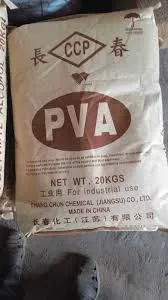Trending – Polyvinyl Alcohol
Whether we're doing laundry or running a dishwasher, most of us are familiar with detergent products that come in a pod. In this post, we'll look at the material used to make these pods, polyvinyl alcohol.

What is polyvinyl alcohol?
Polyvinyl alcohol (PVA) is a water-soluble synthetic polymer, and we encounter it in various applications, from glue to medications to food packaging to pods (1).
We've become more familiar with this ingredient in recent years. We've seen more companies use PVA's unique

sturdy yet water-soluble properties to package concentrated cleaning products in an easy-to-use pod.
However, it's not just safe to use for cleaning purposes. PVA is approved safe by the FDA for food packaging, is considered a GRAS ingredient by the FDA, and has biomedical and pharmaceutical applications as well (1,2,3).
High Purity 99% pva industrial grade polymer powder polyvinyl alcohol pva good price pva 1788 2488 powder
Is it safe for humans?
Sub-chronic toxicity and genotoxicity studies confirm that PVA is safe for humans when exposed via numerous exposure pathways in typical daily exposure (1,2).
However, the ingredients inside the PVA encasement are often not as safe. Pods made from PVA may contain highly concentrated detergents that can cause harm if consumed or exposed to our skin. It's vital to keep these out of children's reach.
Is it safe for the environment?
Research supports that PVA does not negatively impact environmental health when water treatment facilities are available. Water treatment facilities contain the correct microbes to break down the material completely .
Using detergent pods can have a positive impact on the environment as less water is used in the detergent, thus saving water and weight. When the product weighs less, it reduces transportation energy needs helping to offset environmental costs.
Is PVA only used for detergent pods?
There are many uses for PVAs beyond containing detergents.
We've seen PVA used in medical settings tested as soft contact lens material, artificial heart linings, artificial cartilages, catheters, skin, and pancreas membranes (1).
Pharmacologists have explored using PVA as drug delivery systems to distribute medications through various routes effectively. They've also harnessed the film-forming and adhesion properties in body washes, multipurpose creams, and sunscreens .
Researchers and manufacturers continue to explore the potential uses of PVA to keep foods safe. We see PVA in food packaging and commonly used as capsules for dietary supplements. It's safe to consume in normal quantities, and the FDA recognizes it as a GRAS ingredient.
The good news.
We don't always have to sacrifice what's easy for what safe for our health and best for the environment. PVA ingredients are an excellent example of an ingredient positively transforming industries.
-
HEC 100000 Hydroxyethylcellulose for Paint | Superior ThickeningNewsAug.30,2025
-
Wall Putty Rdp Powder Packaging DesignNewsAug.29,2025
-
Introduction to Hpmc Hydroxypropyl Methyl CellulosNewsAug.29,2025
-
Hpmc Industri Grade IntegrationNewsAug.29,2025
-
How to Choose the Right Construction AdhesiveNewsAug.29,2025
-
Construction Adhesive StrengthNewsAug.29,2025





